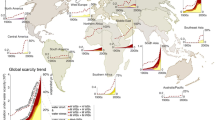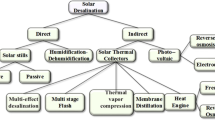Abstract
The economic development has serious impact on the nexus between water, energy, and environment. This impact is even more severe in Non-Organization for Economic Cooperation and Development (non-OECD) countries due to improper resource management. It is predicted that energy demand will increase by more than 71% in non-OECD as compared to 18% in developed countries by 2040. In Gulf Cooperation Council countries, water and power sector consume almost half of primary energy produced. In the past, many studies were focused on renewable energies based on desalination processes to accommodate fivefold increase in demand by 2050 but they were not commercialized due to intermittent nature of renewable energy such as solar and wind. We proposed highly efficient energy storage material, magnesium oxide (MgO), system integrated with innovative hybrid desalination cycle for future sustainable water supplies. The condensation of Mg(OH)2 dehydration vapor during day operation with concentrated solar energy and exothermic hydration of MgO at night can produce 24 h thermal energy without any interruption. It was showed that Mg(OH)2 dehydration vapor condensation produces 120 °C and MgO hydration exothermic reaction produces 140 °C heat during day and night operation, respectively, corresponding to energy storage of 81 kJ/mol and 41 kJ/mol. The produced energy can be utilized to operate desalination cycle to reduce CO2 emission and to achieve COP21 goal. The proposed hybrid desalination cycle is successfully demonstrated by pilot experiments at KAUST. It was showed that MgO + MEDAD cycle can achieve performance over UPR = 200, one of the highest reported ever.
Access this chapter
Tax calculation will be finalised at checkout
Purchases are for personal use only
Similar content being viewed by others
Abbreviations
- OECD:
-
Organization for Economic Cooperation and Development
- COP:
-
Conference of Parties
- GCC:
-
Gulf Cooperation Council
- EAD:
-
Environment Agency Abu Dhabi
- MENA:
-
Middle East and North Africa
- MED:
-
Multi-effect Desalination
- MSF:
-
Multistage Flash
- SWRO:
-
Seawater Reverse Osmosis
- MVC:
-
Mechanical Vapor Compression
- AD:
-
Adsorption
- ED:
-
Electrodialysis
- TES:
-
Thermal Energy Storage
- CSP:
-
Concentrated Solar Photovoltaic
- TBT:
-
Top Brine Temperature
- LBT:
-
Lower Brine Temperature
- LPM:
-
Liter per Minute
- UPR:
-
Universal Performance Ratio
- TL:
-
Thermodynamic Limit
References
Kato Y, Yamashita N, Kobayashi K, Yoshizawa Y (1996) Kinetic study of the hydration of magnesium oxide for a chemical heat pump. Appl Therm Eng 16:853–862
Kato Y, Harada N, Yoshizawa Y (1997) Kinetic feasibility of a chemical heat pump for heat utilization of high-temperature processes. Appl Therm Eng 19:239–254
Kato Y, Saku D, Harada N, Yoshizawa Y (1998) Utilization of high temperature heat from nuclear reactor using inorganic chemical heat pump. Prog Nucl Energy 32:563–570
Kato Y, Nakahata J, Yoshizawa Y (1999) Durability characteristics of the hydration magnesium oxide under repetitive reaction. J Mater Sci 34:475–480
Kato Y, Takahashi F, Sekiguchi T, Ryu J (2009) Study on medium temperature chemical heat storage using mixed hydroxides. Int J Refrig 32:661–666
Munawwar S, Ghedira H (2014) A review of renewable energy and solar industry growth in the GCC region. Energy Procedia 57:3191–3202
Ng KC, Thu K, Oh SJ, Ang L, Shahzad MW, Ismail AB (2015) Recent developments in thermally-driven seawater desalination: energy efficiency improvement by hybridization of the MED and AD cycles. Desalination 356:255–270
Ng KC, Shahzad MW, Son HS, Hamed QA (2017) An exergy approach to efficiency evaluation of desalination. Appl Phys Lett 110:184101
Pardo P, Deydier A, Anxionnaz-Minvielle Z, Rougé S, Cabassud M, Cognet P (2014) A review on high temperature thermochemical heat energy storage. Renew Sustain Energy Rev 32:591–610
Parmigiani L (2015) Water and energy in the GCC: securing scarce water in oil-rich countries. A report by The Institut français des relations internationales (Ifri). ISBN: 978-2-36567-442-3
Renewable Energy Market Analysis (2016) The GCC region. A report by International Renewable Energy Agency (IREA). ISBN: 978-92-95111-81-3
Shahzad MW (2013) The hybrid multi-effect desalination (MED) and the adsorption (AD) cycle for desalination. Doctoral Thesis, National University of Singapore
Shahzad MW, Ng KC (2016) On the road to water sustainability in the Gulf, Nature Middle East. https://doi.org/10.1038/nmiddleeast.2016.50
Shahzad MW, Ng KC (2017) An improved multi-evaporator adsorption desalination cycle for GCC countries. Energy Technol 5:1663–1669
Shahzad MW, Thu K, Kim Y-D, Ng KC (2015) An experimental investigation on MEDAD hybrid desalination cycle. Appl Energy 148:273–281
Shahzad MW, Ng KC, Thu K (2016a) Future sustainable desalination using waste heat: kudos to thermodynamic synergy. Env Sci Water Res Technol 2:206–212
Shahzad MW, Thu K, Ng KC, WonGee C (2016b) Recent development in thermally activated desalination methods: achieving an energy efficiency less than 2.5 kWhelec/m3. Desalination Water Treat 57:7396–7405
Shahzad MW, Burhan M, Ang L, Ng KC (2017a) Energy-water-environment nexus underpinning future desalination sustainability. Desalination 413:52–64
Shahzad MW, Burhan M, Ghaffour N, Ng KC (2017b) A multi evaporator desalination system operated with thermocline energy for future sustainability. Desalination 435:268–277
Shahzad MW, Burhan M, Son HS, Oh SJ, Ng KC (2018) Desalination processes evaluation at common platform: a universal performance ratio (UPR) method. Appl Therm Eng 134:62–67
Shatat M, Riffat SB (2014) Water desalination technologies utilizing conventional and renewable energy sources. Int J Low-Carbon Technol 9:1–19
Shahzad MW, Ng KC, Thu, K, Saha BB, Chun WG (2014) Multi effect desalination and adsorption desalination (MEDAD): a hybrid desalination method. Appl Therm Eng 72:289–297
Thu K, Kim Y-D, Shahzad MW, Saththasivam J, Ng KC (2015) Performance investigation of an advanced multi-effect adsorption desalination (MEAD) cycle. Appl Energy 159:469–477
Author information
Authors and Affiliations
Corresponding author
Editor information
Editors and Affiliations
Rights and permissions
Copyright information
© 2019 Springer Nature Singapore Pte Ltd.
About this chapter
Cite this chapter
Shahzad, M.W., Burhan, M., Ng, K.C. (2019). Renewable Energy Storage and Its Application for Desalination. In: Motoasca, E., Agarwal, A., Breesch, H. (eds) Energy Sustainability in Built and Urban Environments. Energy, Environment, and Sustainability. Springer, Singapore. https://doi.org/10.1007/978-981-13-3284-5_14
Download citation
DOI: https://doi.org/10.1007/978-981-13-3284-5_14
Published:
Publisher Name: Springer, Singapore
Print ISBN: 978-981-13-3283-8
Online ISBN: 978-981-13-3284-5
eBook Packages: EnergyEnergy (R0)




